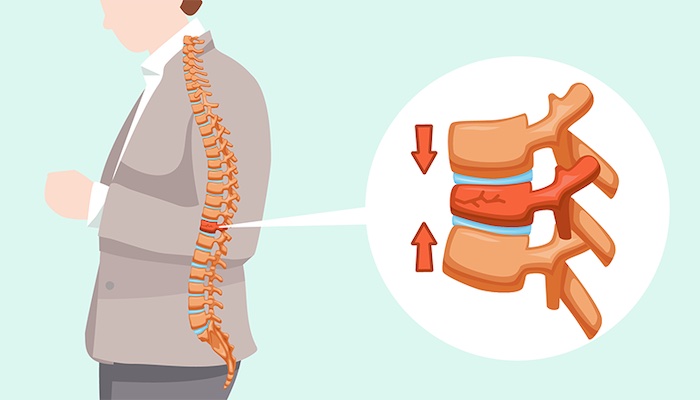
Vertebral Compression Fractures (VCFs) are a common yet often under-recognized source of back pain and discomfort, especially in older adults. These fractures can severely impact quality of life, causing pain, reduced mobility, and decreased daily activities. At Precision Pain Care and Rehabilitation, we provide comprehensive care for patients with VCFs, leveraging Interventional Pain Management techniques to help patients regain their comfort and mobility. In this blog, I will explore what vertebral compression fractures are, why they occur, and how interventional approaches can be used to manage the pain effectively.
What Are Vertebral Compression Fractures?
A vertebral compression fracture is a break in one of the bones of the spine (vertebrae) that results in the vertebra collapsing, which can lead to significant pain and deformity. These fractures commonly occur in the thoracic (mid-back) or lumbar (lower back) regions of the spine. The most vulnerable group is older adults, particularly those with osteoporosis, a condition that weakens the bones and makes them more prone to fractures.
VCFs are not always caused by a significant trauma—sometimes a minor fall or even daily activities like bending or lifting can result in a fracture in individuals with weakened bones. Osteoporosis is the leading cause of VCFs, but they can also occur in cases of metastatic cancer or due to trauma in younger individuals.
Symptoms of Vertebral Compression Fractures
Patients with a vertebral compression fracture may experience:
- Sudden, severe back pain, especially in the middle or lower spine
- Increased pain with standing or walking
- Relief of pain when lying down
- Loss of height over time (due to compression of the vertebra)
- Stooped posture or kyphosis (hunched back)
In some cases, the symptoms are less obvious, leading patients to ignore the pain or attribute it to common back strain.
The Importance of Timely Diagnosis
Untreated vertebral compression fractures can lead to chronic pain, limited mobility, and further deterioration of bone and muscle strength. Over time, this can increase the risk of additional fractures, reducing overall quality of life. A timely diagnosis is key to managing these fractures and preventing complications.
Interventional Pain Management for VCFs
At Precision Pain Care and Rehabilitation, we use interventional pain management techniques to address both the immediate pain and the underlying causes of VCFs. Interventional pain management focuses on minimally invasive procedures to reduce pain and restore function, offering an effective alternative to prolonged use of medications or invasive surgery.
1. Vertebroplasty and Kyphoplasty
Two of the most commonly used interventional procedures for treating vertebral compression fractures are vertebroplasty and kyphoplasty. Both procedures aim to stabilize the fractured vertebra and reduce pain:
- Vertebroplasty involves injecting medical-grade bone cement into the fractured vertebra. The cement hardens quickly, stabilizing the vertebra and providing immediate pain relief in many cases.
- Kyphoplasty is similar to vertebroplasty but includes an additional step. A small balloon is inserted into the fractured vertebra and inflated to create a cavity before the cement is injected. This helps to restore some of the vertebral height that may have been lost due to the fracture.
Both procedures are minimally invasive and are performed on an outpatient basis, allowing for faster recovery and minimal downtime.
2. Nerve Blocks and Facet Joint Injections
In addition to vertebroplasty and kyphoplasty, other interventional treatments can help manage the pain associated with VCFs:
- Nerve Blocks: A targeted injection of anesthetic around specific nerves can help alleviate pain by blocking pain signals from reaching the brain.
- Facet Joint Injections: These injections can be used when the joints in the spine (facet joints) become irritated due to the changes caused by the fracture. Facet joint injections help reduce inflammation and pain.
Comprehensive Rehabilitation Approach
While interventional procedures provide immediate pain relief, a comprehensive rehabilitation program is crucial for long-term recovery. At Precision Pain Care and Rehabilitation, we combine interventional techniques with physical therapy and lifestyle modifications to improve bone health, enhance mobility, and reduce the risk of future fractures.
- Physical Therapy: A tailored physical therapy program helps improve core strength, posture, and flexibility, which can alleviate the stress on the spine and prevent future fractures.
- Lifestyle Modifications: We also emphasize the importance of maintaining bone health through diet, exercise, and appropriate medications for osteoporosis management. Weight-bearing exercises and a calcium-rich diet are essential in maintaining bone density.
Preventing Vertebral Compression Fractures
Preventing VCFs involves addressing the root causes, particularly osteoporosis. Regular bone density screenings, medications to strengthen bones, and lifestyle changes can significantly reduce the risk of fractures. At Precision Pain Care and Rehabilitation, we work closely with our patients to provide education and resources for preventing bone loss and maintaining a healthy spine.
Conclusion
Vertebral compression fractures are a painful and often debilitating condition that can greatly impact a person’s quality of life. However, with timely diagnosis and an interventional pain management approach, patients can experience significant relief from pain and regain their mobility. At Precision Pain Care and Rehabilitation, we aim to provide a personalized treatment plan that includes minimally invasive procedures like vertebroplasty and kyphoplasty, complemented by rehabilitation and lifestyle modifications.
If you or a loved one is struggling with back pain or has been diagnosed with a vertebral compression fracture, reach out to Precision Pain Care and Rehabilitation. We are committed to helping our patients manage their pain and improve their quality of life through a comprehensive, compassionate approach to spine care.
Precision Pain Care and Rehabilitation has two convenient locations in Richmond Hill – Queens, and New Hyde Park – Long Island. Call the Queens office at (718) 215-1888 or (516) 419-4480 for the Long Island office to arrange an appointment with our Interventional Pain Management Specialists, Dr. Jeffrey Chacko or Dr. Sonny Ahluwalia.















